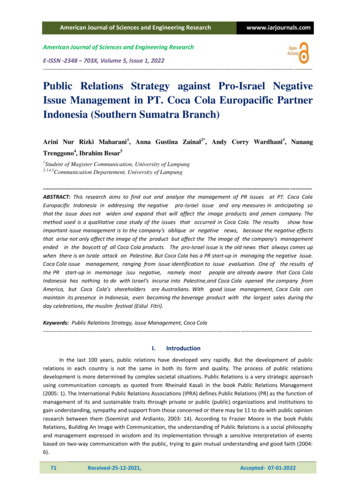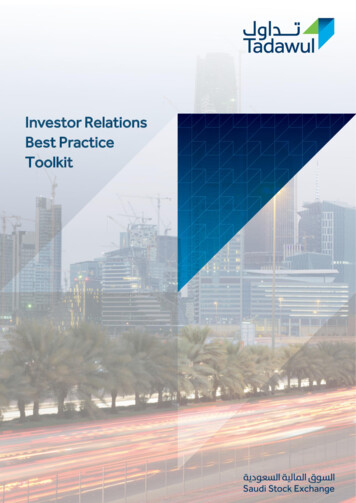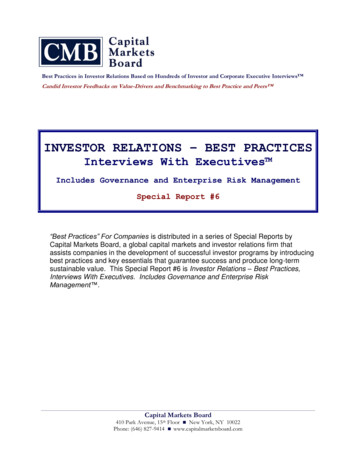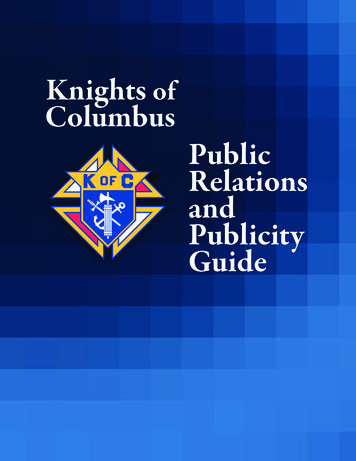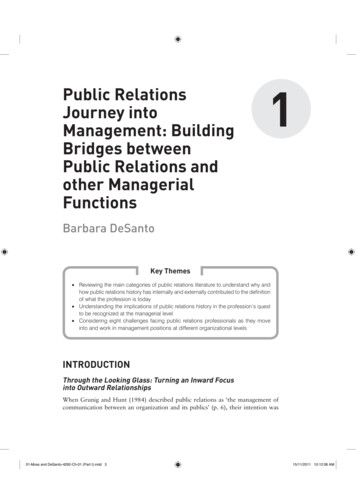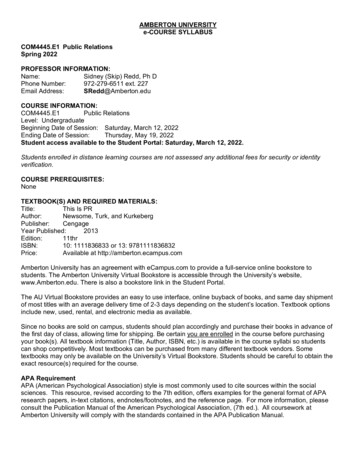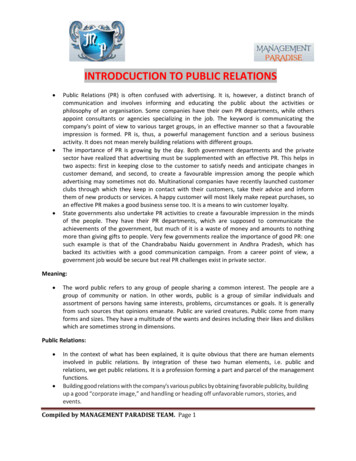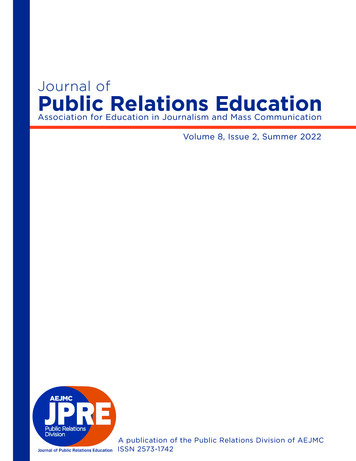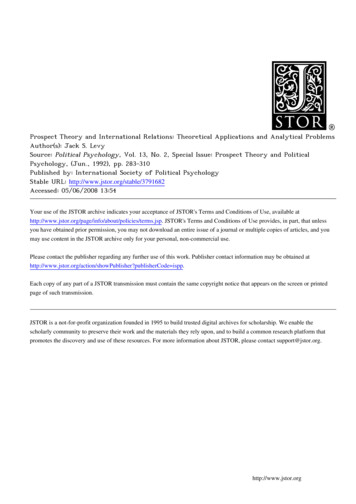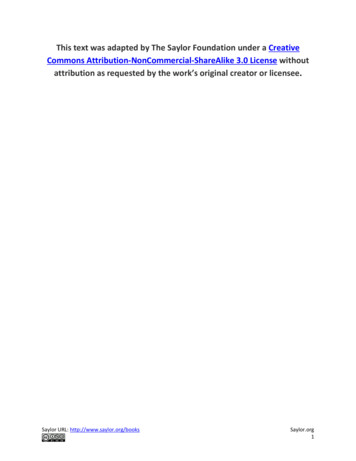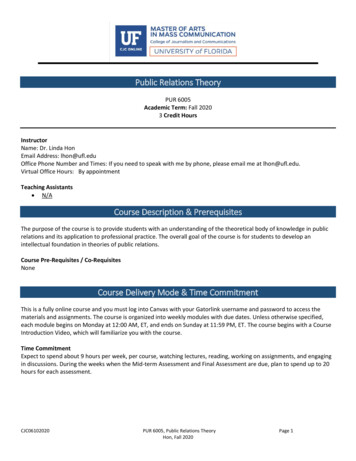
Transcription
Public Relations TheoryPUR 6005Academic Term: Fall 20203 Credit HoursInstructorName: Dr. Linda HonEmail Address: lhon@ufl.eduOffice Phone Number and Times: If you need to speak with me by phone, please email me at lhon@ufl.edu.Virtual Office Hours: By appointmentTeaching Assistants N/ACourse Description & PrerequisitesThe purpose of the course is to provide students with an understanding of the theoretical body of knowledge in publicrelations and its application to professional practice. The overall goal of the course is for students to develop anintellectual foundation in theories of public relations.Course Pre-Requisites / Co-RequisitesNoneCourse Delivery Mode & Time CommitmentThis is a fully online course and you must log into Canvas with your Gatorlink username and password to access thematerials and assignments. The course is organized into weekly modules with due dates. Unless otherwise specified,each module begins on Monday at 12:00 AM, ET, and ends on Sunday at 11:59 PM, ET. The course begins with a CourseIntroduction Video, which will familiarize you with the course.Time CommitmentExpect to spend about 9 hours per week, per course, watching lectures, reading, working on assignments, and engagingin discussions. During the weeks when the Mid-term Assessment and Final Assessment are due, plan to spend up to 20hours for each assessment.CJC06102020PUR 6005, Public Relations TheoryHon, Fall 2020Page 1
Course-Level ObjectivesUpon successful completion of this course, students will be able to:1. Explain the public relations function of an organizational counsel. (CO: 1)2. Explain the purpose of strategic ethical public relations functions. (CO: 2)3. Apply theoretical principles in a public relations plan. (CO: 3)(CO Course-Level Objective)Textbooks & MaterialsRequired Course Pack (To avoid any access problems, please open the PDFs in the Canvas shell for all of the coursereadings rather than use the URLs below.)Lamme, M. O. & Russell, K. M. (2010). Removing the spin. Toward a new theory of public relations history. Journalismand Communication Monographs, 11(4), 281-362.Broom, G. M. (2006). An open-system approach to building theory in public relations. Journal of Public RelationsResearch, 18(2), 141-150. https://doi: 10.1207/s1532754xjprr1802 4Grunig, J. E. (2006). Furnishing the edifice: Ongoing research on public relations as a strategic management function.Journal of Public Relations Research, 18(2), 151-176.Porter, L. (2010). Communicating for the good of the state: A post-symmetrical polemic on persuasion in ethical publicrelations. Public Relations Review, 36, 127-133. https://doi: 10.1016/j.pubrev.2009.08.014Macnamara, J. (2016). Organizational listening: Addressing a major gap in public relations theory and practice. Journal ofPublic Relations Research, 28, 3-4, 146-169. https://doi: 10.1080/1062726X.2016.1228064Smith, B. (2015). Situated ideals in strategic social media: Applying grounded practical theory in a case of successfulsocial media management. International Journal of Strategic Communication, 9(4), 272–292. https://doi:10.1080/1553118X.2015.1021958.Allagui, I. & Breslow, H. (2016). Social media for public relations: Lessons from four effective cases. Public RelationsReview, 42, 20-30. https://doi.org/10.1016/j.pubrev.2015.12.001Veil, S. R. & Anthony, K. E. (2017). Exploring public relations challenges in compounding crises: The pariah effect of toxictrailers. Journal of Public Relations Research, 29(4), 141-157. https://doi: 10.1080/1062726X.2017.1355805Jin, Y., Austin, L., Vijaykumar, S. Jun, H., & Nowak, G. (2019). Communicating about infectious disease threats: Insightsfrom public health information officers. Public Relations Review, 45, 03Gaither, B. M., Austin, L., & Collins, M. (2018). Examining the case of DICK’s Sporting Goods: Realignment of stakeholdersthrough Corporate Social Advocacy. Journal of Public Interest Communications, 2(2), 2020PUR 6005, Public Relations TheoryHon, Fall 2020Page 2
Bowen, W. T. (2010). The nature of good in public relations: What should be its normative ethic? In E.L. Heath (Ed.), TheSAGE handbook of public relations (pp. 569-583). SAGE.Trayner, G. (2017). Why values matter – how public relations professionals can draw on moral foundations theory. PublicRelations Review, 43, 123-129. https://doi: 10.1016/j.pubrev.2016.10.016Molleda, J-C., Kochhar, S., & Wilson, C. (2015). Tipping the balance: A decision-making model for localization in globalpublic relations agencies. Public Relations Review, 41, 335-334. https://doi: 10.1016/j.pubrev.2015.05.004Gregory, A., & Fawkes, J. (2019). A global capability framework: Reframing public relations for a changing world. PublicRelations Review, 45, 101781. https://doi: 10.1016/j.pubrev.2019.05.002Golombisky, K. (2015). Renewing the commitments of feminist public relations theory from Velvet Ghetto to socialjustice. Journal of Public Relations Research, 27(5), 389-415. https://doi: 10.1080/1062726X.2015.1086653Logan, N. (2011). The White Leader prototype: A critical analysis of race in public relations, Journal of Public RelationsResearch, 23(4), 442-457. https://doi: 10.1080/1062726X.2011.605974Men, L. R., Chen, Z. F., & Ji, Y. G. (2018). Walking the talk: An exploratory examination of executive leadershipcommunication at startups in China. Journal of Public Relations Research, 30(1-2), 35-56.https://doi: 10.1080/1062726X.2018.1455147Dhanesh, G. S. (2017). Putting engagement in its proper place: State of the field, definition and model of engagement inpublic relations. Public Relations Review, 43, 925-933. https://doi: 10.1016/j.pubrev.2017.04.001Auger, G. (2014). Trust me, trust me not: An experimental analysis of the effect of transparency on organizations.Journal of Public Relations Research, 26(4), 325-343. https://doi: 10.1080/1062726X.2014.908722Molleda, J-C. & Jain, R. (2013). Testing a perceived authenticity index with triangulation research: The case of Xcaret inMexico. International Journal of Strategic Communication, 7(13), 1-20. https://doi: 10.1080/1553118X.2012.725233Woods, C. L. (2019). From an “outside group” to a catalyst for corporate change: Examining activists’ legitimationstrategies. Public Relations Review, 45, 332-347. https://doi: 10.1016/j.pubrev.2019.02.001Cisek, E., & Logan, N. (2018). Challenging the dialogic promise: How Ben and Jerry’s support for Black Lives Matterfosters dissensus on social media. Journal of Public Relations Research 30(3), 115-127. ed Textbook(s)American Psychological Association. (2020). Publication manual of the American Psychological Association: Theofficial guide to APA style (7th ed.). ISBN-13: 978-1433832161 ISBN-10: 143383216XChanges in the APA 7th EditionPublisher MaterialsN/ACJC06102020PUR 6005, Public Relations TheoryHon, Fall 2020Page 3
Course ReservesN/AMinimum Technology Requirements & Computer SkillsCOMPUTER REQUIREMENTSBasic Computer Specifications for Canvas SpecificationsReliable Web Browser: Login to Canvas and make sure your Internet browser is compatible.Peripherals A backup option should be available to minimize any loss of work such as an external hard drive, a USB drive,cloud storage, etc.Hardware Dependable computer.Computer speakers.Headset with microphone.Webcam.Software Microsoft Office 365UF Apps – access UF software applications from any device from any location, at any time.Canvas Mobile App: Download instructions for iOS device or Android device.Adobe Readerhttps://ufl.zoom.us/Internet Connection Recommended: Broadband Internet connection with a speed of 4 Mbps or higher.To function properly, Canvas requires a high-speed Internet connection (cable modem, DSL, satellite broadband,T1, etc.). The minimum Internet connection speed to access Canvas is a consistent 1.5 Mbps (megabits persecond) or higher.Check your Internet speed here.Subscriptions, Plug-Ins, and Other Tools Adobe Flash Player (Good until the Microsoft update December 31, 2020.)MINIMUM COMPUTER AND DIGITAL INFORMATION LITERACY SKILLS REQUIREMENTSThe general and course-specific computer and digital information literacy skills you must have to succeed in the courseinclude, but are not limited to, the following: Accessing the Internet. Using Canvas.CJC06102020PUR 6005, Public Relations TheoryHon, Fall 2020Page 4
Using email with attachments.Creating and submitting files in processing program such as Microsoft Office Tools.Copying and pasting functions.Downloading and installing software.Using presentation, graphics, and other programs.Posting and commenting in an online discussion.Searching the University of Florida library and websites.Technical SupportIn the event that you have technical difficulties with your course, please contact the UF Computing Help Desk either byfilling out an online request form or calling 352-392-4357 - select option 1. The Help Desk is located on the ground floorof the Hub on the UF campus.If your technical difficulties caused you to miss a due date, you MUST report the problem to the Help Desk and thenemail your instructor. Include the ticket number that you are given from the Help Desk in an email to the instructor toexplain the late assignment/quiz/test.IT SupportFor all Technical assistance questions please contact the UF Computing Help Desk:Phone: 352-392-HELP (4357)Email: helpdesk@ufl.eduPlease NoteYour instructor is not able to handle technological issues or answer questions related to computer issues. If a problemof this nature arises that causes you to miss an assignment, you must provide your Help Desk ticket number to theinstructor in order to receive an extension.Course Grading PoliciesGrading Criterion, Late Assignment Policy, and Expectations for AssignmentsGRADING CRITERIONDiscussion Boards (60 %)Your initial post must be a substantive and scholarly submission. You must reply to at least one other student’s post witha substantive response. A substantive response adds scholarly value to the discussion by addressing the instructordiscussion prompts in a way that demonstrates your understanding of the course materials while also critically analyzingstrengths and limitations among a variety of theories. Also, as the class unfolds, you should demonstrate your ability tosee connections and contradictions among the theories.The discussion post assignments follow the Watch, Read, Discuss, Connect, and Respond (WRDCR) format. Each week,you will watch the lecture video, read the assigned course materials, comment on the instructor discussion prompts thataddress the readings, connect with and comment on some application of the theory to the public relations professionthat is provided (e.g., videos, websites, industry examples), and respond to another student’s post.CJC06102020PUR 6005, Public Relations TheoryHon, Fall 2020Page 5
The initial discussion post and response to another student’s post are graded as one assignment. So, you will see thefinal due date in the Canvas shell as Sunday, 11:59 PM, ET. However, please remember to leave enough time tothoughtfully comment on another student’s post since you will not be able to see others’ posts until you have postedyourself.Detailed and specific guidelines for the discussion posts and grading rubric are provided in the course shell.Mid-term Assessment (20 %)Final-Assessment (20 %)The Mid-Term and Final Assessments are individual and creative projects that expect you to synthesize the maintheoretical principles covered in the course and apply them to professional settings and clients. There are two parts—(1)producing the project (15 %) and (2) providing feedback to another student on his or her project as well as analyzingyour own in light of what you learned from your class peer’s project (5 %). Detailed and specific guidelines for theAssessments and grading rubrics are provided in the course shell.Your grade will be calculated based on the following:Assignments/AssessmentsCourse Orientation: These assignments are required; however, they not count toward the finalgrade. Course Introduction Video Introduce Yourself on Canvas Course Evaluation11 WRDCR Discussions Worth up to 100 points each.1 Mid-term Assessment Worth up to 100 points.1 Final-Assessment Worth up to 100 points.TOTALGradeAAB BBC CCD DDECJC06102020Points0Weight %0 – 59.4%PUR 6005, Public Relations TheoryHon, Fall 2020Page 6
The only passing grades for graduate students are A, A-, B , B, B-, C , C, and S. Grades of B-, C or C count toward agraduate degree if an equal number of credits in courses numbered 5000 or higher have been earned with grades of B ,A- and A, respectively. Grade points are not given for S and U grades; S and U grades are not used to calculate gradepoint averages. All letter-graded courses eligible to count toward the graduate degree, except 1000- and 2000-levelcourses, are used to calculate the cumulative grade-point average. Letter grades of C-, D , D, D- or E are not consideredpassing at the graduate level, although the grade points associated with these letter grades are included in grade pointaverage calculations. See the UF grading policy for more information.LATE ASSIGNMENT POLICYLate assignments will not be accepted unless it is a University excused absence as stated in the attendance policies. Nolate work will be accepted for final projects or work due in the final week of class due to the university gradingdeadlines. If potential issues arise concerning submitting final work, students should contact their instructors beforedeadlines to discuss the possibility of an Incomplete Grade Contract.1. Late Assignment Grade Reductionsa. 0-24 Hours Late: 10% reduction in grade.b. Over 24 Hours (24 hours and 1 minute) to 7 Calendar Days Late: 20% reduction in grade.c. After the 7th Calendar Day: Work will not be accepted.2. Late Discussions will not be accepted.EXPECTATIONS FOR ASSIGNMENTS Course EvaluationStudents are expected to provide professional and respectful feedback on the quality of instruction in thiscourse by completing course evaluations online via GatorEvals. Guidance on how to give feedback in aprofessional and respectful manner is available at https://gatorevals.aa.ufl.edu/students/. Students will benotified when the evaluation period opens, and can complete evaluations through the email they receive fromGatorEvals, in their Canvas course menu under GatorEvals, or via https://ufl.bluera.com/ufl/. Summaries ofcourse evaluation results are available to students at ssibility PolicyStudents requiring reasonable access to services and resources required by the Americans with Disabilities Act of 1990,Section 504 of the Rehabilitation Act of 1973, and other applicable federal and state regulations, please access UFAccessibility for all options available to you. Once registered, students will receive an accommodation letter which mustbe presented to the instructor when requesting accommodations. Please register early!Contact Information For ADA questions: Dr. Russ Froman, rfroman@ufl.edu , Phone: 352 - 273-1094 Disability Resource Center: Gerry Altamirano, galtamirano@ufl.edu , Phone: 352 - 392-8565 Electronic Information Technology & Communication Accessibility: Anne Allen, alallen@ufl.edu , Phone: 352- 8712707 For persons with hearing or speech related accessibility needs: When trying to access an office on campus thatdoes not list a TDD/TTY number, contact the Florida Relay Service at 800-955-8771(TDD) or 711 (V/TDD).Accessibility Resource CenterCJC06102020PUR 6005, Public Relations TheoryHon, Fall 2020Page 7
University of FloridaPO Box 114085Gainesville, FL 32611-4085Phone: 352-392-8565Email: accessuf@dso.ufl.eduAddressEnvironmental Health and Safety Administrative Offices916 Newell DrGainesville, FL 32603For more information, see UF’s Electronic Information Technology Accessibility (EITA) Policy.Communication PolicyEXPECTATIONS FOR STUDENTSAnnouncementsYou are responsible for reading all announcements posted in the courseroom each time you log in.EmailYou are responsible for reading all your course email and responding in a timely manner (please try to respond within 24hours).INSTRUCTOR’S PLAN FOR CLASSROOM RESPONSE TIME AND FEEDBACKEmail PolicyI try to respond to your email within 24 hours. If you have questions of a personal nature, please email me.Assignment Feedback PolicyI will provide feedback on submitted assignments as soon as possible but no later than one week after the submissiondate. If assignments require a longer review period, I will communicate that to you.Course-Related Questions PolicyI try to answer questions within 24 hours.Electronic Communication PolicyIn addition to the University’s policy, please consider the following: Privacy, confidentiality, and security in all electronic communications. See Information Security. All electronic communication resources must be used for the course and in alignment with to the CJC Online andUniversity mission. See the Acceptable Use Policy. Prohibited use of false identity, false identity pseudonyms, or anonymous (sender’s name or electronicidentification is hidden). Prohibited online access without consent. Prohibited disruption of services including introducing computer contaminants (viruses). Prohibited harassment of any kind.PrivacyCJC06102020PUR 6005, Public Relations TheoryHon, Fall 2020Page 8
Please see UF’s Information Technology policies for information.Select CJC and University Policies and GuidelinesAcademic Integrity PolicyUF students are bound by The Honor Pledge which states, “We, the members of the University of Florida community,pledge to hold ourselves and our peers to the highest standards of honor and integrity by abiding by the Honor Code.”The Student Honor Code, Violation of the Student Honor Code, specifies a number of behaviors that are in violation of thiscode and the possible sanctions. Furthermore, you are obligated to report any condition that facilitates academicmisconduct to the appropriate personnel. If you have any questions or concerns, please consult with the instructor orTA’s in this class.NetiquetteCasual style of communication is commonly found in the online environment and students are sometimes tempted torelax their grammar, word choice, syntax (arrangement of words to create well-formed sentences), writing mechanics(capitalization, punctuation, and spelling), and/or professionalism. Keep in mind when communicating with others to becourteous, civil, respectful, and professional. Please remember that you are adult students and professionals—yourcommunication must be appropriate.Online Attendance PolicySince the course is online, you should access your course at least four times per week to ensure you do not misspertinent postings, messages, or announcements. It is imperative that you meet course deadlines and stay active indiscussion boards, projects, etc. If you are experiencing a major illness, absences due to University duties, or other largescale issues, contact the instructor immediately.Students are responsible for meeting all academic objectives as defined by the instructor. In general, acceptable reasonsfor absences include illness, serious family emergencies, special curricular requirements, military obligation, severeweather conditions, religious holidays, and participation in official University activities. Absences from class for courtimposed legal obligations (e.g., jury duty or subpoena) must be excused. Excused absences must be consistent withuniversity policies in the Graduate Catalog and require appropriate documentation. For additional information, see theattendance policies.PlagiarismPlagiarism is unacceptable; especially, in the academic communities. All academic work must be an original work of yourown thought, research, or self-expression. Plagiarism includes, but is not limited to, prohibited collaboration,consultation, submission of academic work that has been purchased or obtained (see the UF Policy: Student ConductViolation). Remember that plagiarism is not acceptable in any of your work including all discussion board posts, journalentries, wikis, and other written and oral presentation assignments. Always cite your sources!Software UseAll faculty, staff, and students of the University are required and expected to obey the laws and legal agreementsgoverning software use. Failure to do so can lead to monetary damages and/or criminal penalties for the individualviolator. Because such violations are also against University policies and rules, disciplinary action will be taken asappropriate. We, the members of the University of Florida community, pledge to uphold ourselves and our peers to thehighest standards of honesty and integrity.Notification to Students of FERPA RightsCJC06102020PUR 6005, Public Relations TheoryHon, Fall 2020Page 9
There are federal laws (FERPA) protecting your privacy with regards to grades earned in courses and on individualassignments.Student Guidelines for Courseroom ChallengesStudent with questions regarding course content such as assignments, assessments, instructional materials, lectures,meetings, course objectives, course module objectives, or other areas of the course, please adhere to the followingguidelines:1. You should first approach the faculty member who is teaching the course to ask for clarifications regarding thecourse assignments, assessments, materials, lectures, meetings, etc.2. If after meeting with the faculty member teaching the course you are still not clear on the course assignments,assessments, materials, lectures, meetings, etc., then the next step would be to contact online advising(onlineadvising@jou.ufl.edu) for additional guidance.Writing StyleIn order to meet the academic rigor and standards of a graduate program, all students are required to use thePublication Manual of the American Psychological Association (APA) 7th Edition style in their courses. The APA 7th EditionManual has a plethora of guidelines that includes scholarly writing, publishing principles, elements and format for yourpapers, writing style and grammar, bias-free language guidelines, mechanics of style, in-text citing and references, etc.For additional information on notable changes, see changes between APA 6th Edition and APA 7th Edition.Academic and Student ResourcesAcademic Resources One UF Student Portal – Course registration, final grades, transcript requests, degree audit. GatorEvals – Online faculty evaluations and results. UF Bookstore: Phone: 352-392-0194, Email: ufbookstore@bsd.ufl.edu Library Support: Various ways to receive assistance with respect to using the libraries or finding resources.UF Library Services for Distance StudentsAsk a Librarian – chat with librarians online.CJC Librarian - April Hines, Phone: 352-273-2728, Email: aprhine@uflib.ufl.edu.Course Reserves: Electronic resource reserve items that can be accessed via links or files. Copyright Concerns of Graduate Researchers: Information and resource guide on copyright concerns. Teaching Center: General study skills and tutoring. Broward Hall, Phone: 352-392-2010 or 352-392-6420. Writing Studio: Provides one-on-one consultations and workshops tailored to specific classes (graduate andundergraduate). 302 Tigert Hall, Phone: 352-846-1138. Online Student Complaints: This process is designed to make every attempt to resolve student complaints withinits academic and administrative departments at the program level. Information for Veterans: Veterans Affairs Certification: Phone: 352 - 294-2948CJC06102020PUR 6005, Public Relations TheoryHon, Fall 2020Page 10
Student Resources Graduate Student Resources: Available resources for graduate students. Your advisors are here to support you,answer questions, help with registration, and other sources. Email onlineadvising@jou.ufl.edu. U Matter, We Care: If you or a friend is in distress, please contact umatter@ufl.edu or Phone: 352-294-2273 sothat a team member can reach out. Counseling and Wellness Center: 3190 Radio Road, Gainesville, FL 32611Phone: (352) 392-1575, Fax: (352) 273-4738 Sexual Violence Response: Victim services, Care Area, UF Police Department, and Title IX. University Police Department: Resources available include the Office of Victim Services and Community ServicesDivision. Emergency: 9-1-1; Non-Emergency: 352-392-1111. Gator Connect: Online database of student organizations. Career Connection Center: Career assistance and counseling. Reitz Union, Phone: 352-392-1601. Veteran Services: Office of Student Veteran Services, Phone: 352-294-2948, email: vacounselor@ufl.edu. Collegiate Veterans Success Center, Phone: 352- 294-7215, email: charlotte.kemper@va.gov. Student Financial Affairs: Financial aid counseling including Aid-a-Gator program. Phone: 352-392-1275. Student Success Coach: Meet with a graduate student coach that can support you in numerous ways during yourtime in graduate school, such as time and stress management, motivation, organization, and much more.The instructor reserves the right to adjust this syllabus, as necessary.CJC06102020PUR 6005, Public Relations TheoryHon, Fall 2020Page 11
CJC06102020 PUR 6005, Public Relations Theory Page 2 Hon, Fall 2020 Course-Level Objectives Upon successful completion of this course, students will be able to: 1. Explain the public relations function of an organizational counsel. (CO: 1) 2. Explain the purpose of strategic ethical public relations functions. (CO: 2) 3.
